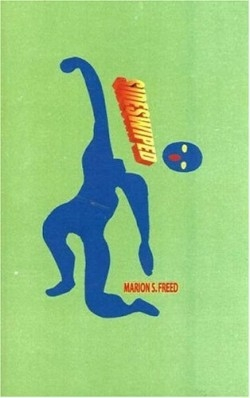
Sideswiped
At a national optimism convention Marion S. Freed might not fit in—especially if she toted her elegantly constructed rarely predictable yet ultimately pessimistic collection of four short stories. However calculated however painstaking her writing might be it’s a downer that the colors of her prose paint such dark skies. What is the reader to make of worlds in which hope dies eternal?
In the end it’s anybody’s guess. Consider “Stalking Mandy.” Following a troubled undergrad’s death his father guilt-ridden over his mediocre parental performance seeks explanatory clues. He is as Freed characterizes him very much the Father Who Truly Cared. Yet it turns out his son hated him—he hated all those wonderful and heartwarming father-son moments recollected in Freed’s narrative. The message: Thanks for nothing Dad.
Then there’s the fate of Phyllis Zimmerman in “The Unkindest Cut.” Things start on an up note when a nose job makes her beautiful and her bewitched boss romances her. Yes the wealthy socialite that Phyllis’ father is dating treats her badly but no matter: Phyllis is happily couture-shopping with the boss and also dating the boss’s nephew a spectacularly handsome fellow poised to someday run the company. Naturally (if implausibly) Phyllis discovers too late that there’s a sexual cost to receiving a boss’s largesse and that even for young men in love career aspirations may trump love. Phyllis assumed her father would be there if all went sour but wrong again: he marries the socialite leaving Phyllis alone with her nose.
No this isn’t the kind of fiction to turn to after reading Harold S. Kushner’s Why Do Bad Things Happen to Good People? If anything Sideswiped is likely to sell more copies of Kushner’s best-selling soother. Maybe because it lacks such a salve the third story “Black Magic” is out-and-out depressing. Ruthie is a menopausal sad-sack: her history includes a failed marriage and a pair of snarky twerps for kids. Then Ruthie meets a man who changes it all and the fact that he is of color is inextricably tied to her suddenly experiencing a miracle of joy—joy on a scale that encourages Ruthie to put people and things close to her at risk so that she may fairly bathe in it. Then he betrays her. At least in the final tale “The Opportunist” a monumentally narcissistic actor—who is a wastrel a scoundrel a cuckold and a murderer—earns his misery.
Everyone knows life is a crapshoot: odds notwithstanding one could die in a plane crash suffer a stroke in the street or lie dead under a car with bad brakes. Whereas horror fiction moves a reader into ghastly realms from a safe remove these fantasies are reality-based: the characters and their situations are equally plausible and sad. There’s that saying “Life sucks and then you die” which seems fair if one wishes to categorize life that way. Who though wants to do that?
Reviewed by
Leonard Jacobs
Disclosure: This article is not an endorsement, but a review. The publisher of this book provided free copies of the book and paid a small fee to have their book reviewed by a professional reviewer. Foreword Reviews and Clarion Reviews make no guarantee that the publisher will receive a positive review. Foreword Magazine, Inc. is disclosing this in accordance with the Federal Trade Commission’s 16 CFR, Part 255.
